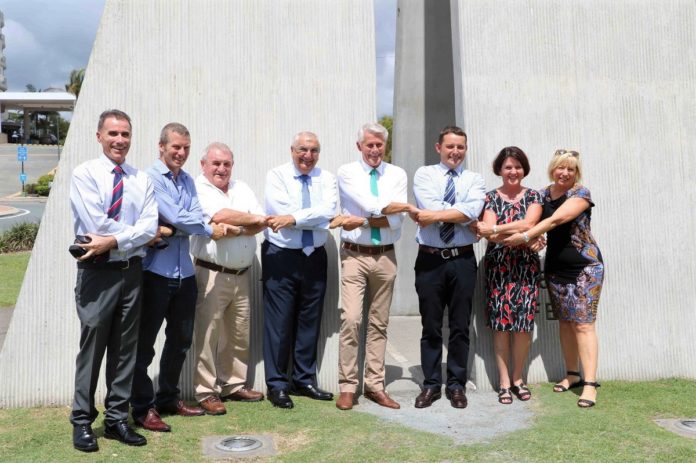
NEW SOUTH Wales and Queensland are set to strengthen cross-border relations with a landmark agreement announced today that will mean streamlining transport, economic development, health services including NDIS and family services.
For decades services have stopped at the border and the new collaboration will help reduce service disruption and develop stronger relations between the two States.
NSW Cross Border Commissioner, James McTavish was joined by representatives from both Tweed and Gold Coast councils, the Member for Tweed, Geoff Provest, Member for Lismore, Thomas George and State Member for Currumbin, Jann Stuckey, at an announcement at the Border Marker at Tweed Heads/Coolangatta this morning.
NSW Deputy Premier, John Barilaro, today welcomed the announcement of the NSW-Queensland ‘Statement of Principles and Priorities for Regional Collaboration 2016-19’, hailing it as a landmark agreement between the two States.
“This is fantastic news for people living and working on both sides of the border and will greatly assist in the resolution of long standing border anomalies,” he said.
“Better coordination of government services through more effective collaboration across state lines means greater outcomes for communities.
Governments will be tasked to address issues on a project-by-project basis in four key areas; regional economic development, alignment of services and sharing of information, local transport and issues of national significance.
It provides for better recognition of teacher registration and accreditation, joint planning and response to emergencies, and the integration of cross-border bus services and point-to-point transport.
“Major border infrastructure projects and the harmonisation of heavy vehicle regulations will also be actively progressed,” Mr Barilaro said.
“A very important component of the agreement is the opportunity to better share information with interstate government agencies to ensure the protection of children and victims of domestic violence.
“My government colleagues in Tweed, Lismore, Northern Tablelands and Barwon have long championed the cause of cross-border communities, highlighting the difficulties and challenges of living and working near a border.
Member for Tweed, Geoff Provest said cross-border problems have an impact on business operators and residents alike.
“This agreement represents a positive outcome the Tweed and is a great step forward for communities on both sides of the border,” he said.
Thomas George, Member for Lismore, agreed, saying this was great news for his electorate.
“The whole of the north-west boundary of the Lismore electorate is the Queensland border, so this is great news for those townships and rural areas – better cross border communication will make a positive difference to the lives of people who are living, working and running businesses both sides of the border,” he said.
The agreement follows the recent signing of the ACT-NSW Memorandum of Understanding for Regional Collaboration. The Deputy Premier said it proves the NSW Government is committed to the resolution of cross-border issues.
“I’m delighted this agreement has finally come to fruition and look forward to working with my government colleagues, the NSW Cross-Border Commissioner and the Queensland Government to tackle the multitude of cross-border issues.”
Tweed Shire Council Director Planning and Regulation, Vince Connell said the plan was a positive step forward in addressing many of the entrenched cross-border issues which affect Tweed residents and businesses.
“Better collaboration by government agencies on both sides of the border will lead to better outcomes for our residents,” Mr Connell said.
Premier Annastacia Palaszczuk announced earlier this morning that she will use a renewed cross-border agreement with New South Wales as the foundation for a partnership with its new Premier Gladys Berejiklian
“Former Premier Mike Baird and I worked on renewing the agreement signed between both States in 2011,” Ms Palaszczuk said.
“Our focus was on driving economic development, improving access to services and sharing information to support vulnerable families and children, working on local transport initiatives and partnering on shared national issues.”
“While the agreement was negotiated with Premier Baird, I believe it is a foundation for a partnership with Premier Berejiklian and her Government.”
“These are key issues for our State and I look forward to working with the Premier for the best outcomes for our communities.”
The areas of focus and priority areas under the Queensland and New South Wales Statement of Principles and Priorities for Cross-border Collaboration 2016-19 are:
Regional Economic Development
The priority areas are:
- Collaborative planning for future cross-border urban and regional developments.
- Undertaking a systematic approach to addressing the issues in approved urban and regional developments in cross-border communities.
- Joint advocacy for major infrastructure projects.
- Identifying infrastructure constraints and public domain improvements to encourage investment in cross-border regions.
Aligning Services and Sharing Information
Residents living in cross-border regions should have equitable access to services and avoid the need for residents to navigate both service systems.
In respect to vulnerable families and children, information sharing is central to providing appropriate services for families who may live or work across borders, or who may move from one state to another.
The priority areas are:
- The protection of children.
- A person-centred approach to the access and delivery of health care services.
- Keeping communities safe.
- Enhanced sharing of information between agencies to support service planning and delivery.
Local Transport
The priority areas include:
- Greater efficiencies in delivering flexible border transport solutions.
- Integrated border bus services.
- Alignment of priority border road projects.
Issues of National Significance
The priority areas include:
- The protection and well-being of victims of domestic and family violence.
- Roll-out of the National Disability Insurance Scheme.
- Expansion of mutual recognition arrangements.
- Consistent action on waste management.
- Harmonisation of heavy vehicle regulations, where applicable.
- Sharing information to advance the Council of Australian Governments’ reform agenda.